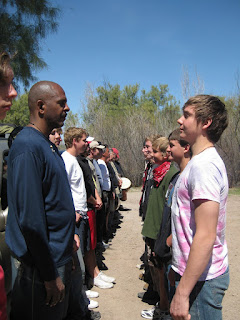Stop reading for a moment, close your eyes, and try to remember . . . when did you, without question, become a "man?"When was that moment in time when you knew, for sure and without doubt, you were now a certified "man?" When did you irrevocably cross the line from boyhood to manhood, accept adult male responsibilities, and thereafter were seen and treated as a man in the eyes of your family, peers, and community?
When I asked this question of men as part of the research for the Man-Making book, some men said it was when they got a license to drive, cast their first vote, or had sex for the first time. Other men said, "when I went into the service," "when I had a child," or "when I got a gun (gang member)." There were a few men who experienced rites of passage in their religious community, in scouting or in a gang. But by far the most common response to that question was, "I'm not sure I am a "man" today!" Most men said they had never definitively crossed a clear or obvious line into manhood and remained uncertain men today.
When I say "uncertain men," I mean these guys were fully functional males in the world today, but they were confused about what attributes define a mature and fully realized man in their society. They were uncertain about the criteria for becoming a man, the achievement path to that goal, if there is one, and not at all clear about how or who will ultimately bestow the blessing of one day having become "a real man."
. . . what attributes define a mature and fully realized man . . .If uncertainty is a theme for men, consider how hard/impossible it is for adolescent males, without good men around them, to ever feel they been set on a positive path toward a solid manhood. They are being propelled toward manhood by testosterone, a hormone drives them to action, intensity, sexual expression, and the need to constantly test and prove themselves in some way. Without guidance, these natural expressions of young male energy, combined with an underdeveloped capacity for thinking through the consequences of their choices, all too often have terribly tragic consequences. It's why I say we don't so much have a violence problem in our communities, but an epidemic of under-male-nourished boys.
Ancient rites of passage, perfected over thousands of years, were exquisitely designed to get the attention of young males and help them shape their mature masculine identity. Sadly, positive passage experiences for males are hard to come by today, and too many males are left to wander in that never-never land between boyhood and manhood.
Because I believe in intentional man-making, I feel it's critical to acknowledge a young male's passage from the world of boyish things into young adulthood. One of the ways I do that is to work with groups of men who are initiating adolescent males in rite of passage experiences. This work clearly sets boys on a positive journey toward manhood, and lets them know they are supported by men. The second reason for these events is to offer an experience in which men can discover they are indeed hardwired for this work. By initiating young males, men can find answers to some of their lingering questions about what constitutes "a real man." I'll continue to write about this in future posts.
From my research and experiences, I've learned that male rite of passage events, wherever they occur, have some common and important elements. Remember, this template has emerged from thousands of years of man-making experience from cultures across the globe. VERY simply and generally stated, here is a short list:
- A dramatic departure from the women, children, and elders.
- Travel to an unknown (to the initiates) place in a natural setting.
- Arrival in a special men-only location.
- Learning to be accountable to and take direction from the men.
- Deprivation, trials, and testing.
- Acquiring knowledge and masculine skills.
- Serious talk from adult men and respected elders about the responsibilities that define a man.
- Rituals in many aspects of the experience.
- Fires, drumming, and often some expression of wildman energy.
- Being given a new name, bodily markings, clothing, talismans, or tools for the men's world.
- Experiencing a moment in time when you have become, are acknowledged and honored by the men and elders as, a new man.
- With ceremony, ritual, and often feasting, returning to your community and being again celebrated for your new identity.
Clearly this example doesn't fit the world most of us inhabit. But it was most likely built on a few hundred years experience with man-making. In 2007, after their month of training and preparation, on returning to their village, these initiates will have no question they have crossed a line into manhood, and that's quite the gift.
If you want to learn how to create a culturally relevant and contemporary rite of passage experience for the boys in your world, give me a shout. I'm happy to be a guide to help create the experience. Along the way, I'll help you and your men friends discover you really are hardwired for this work.
(Check out more questions for men about manhood on the Man-Making website.)
LIKE: If you enjoy this blog, please click the "Like" button below to support the Man-Making Facebook page!
TWEET: Send this post along to your friends or follow me on Twitter!
SUBSCRIBE: If you're not yet a subscriber to the Man-Making Blog, and you'd like to receive these posts by email 3-4 times a month, go to this link for a free subscription.
CONTACT: Send Earl a message.

No comments:
Post a Comment
Your response to this blog post is appreciated and welcome. Thanks!